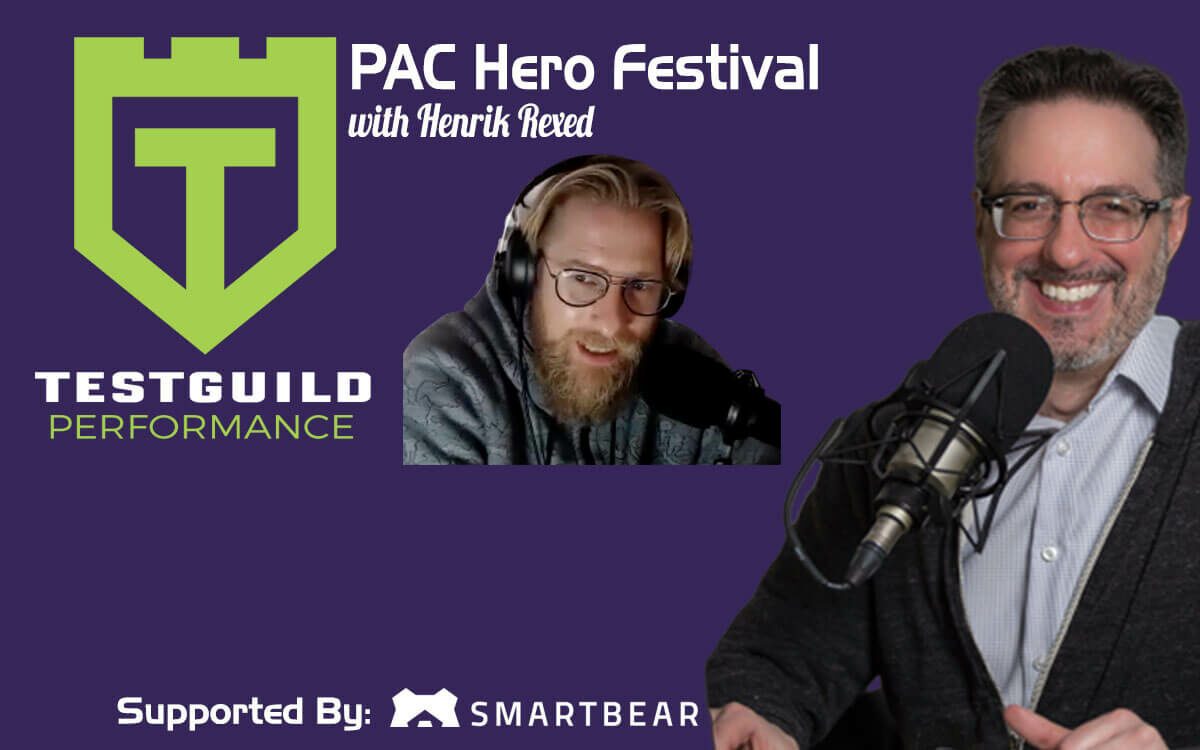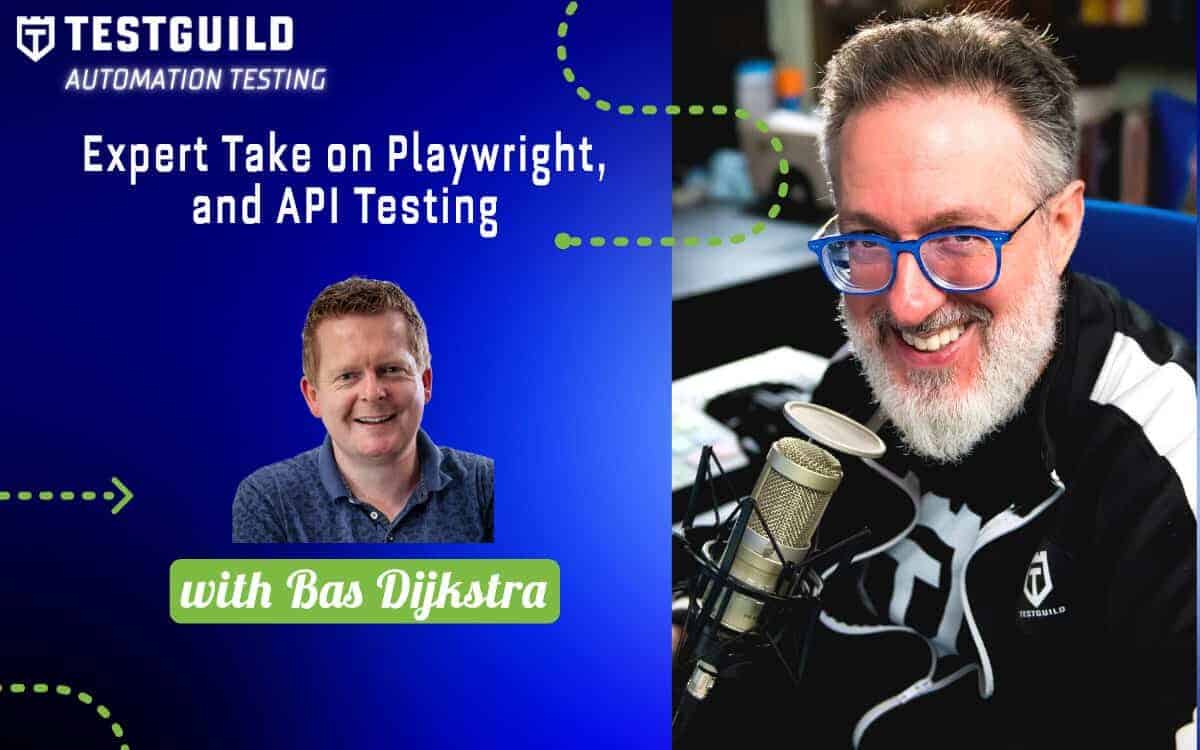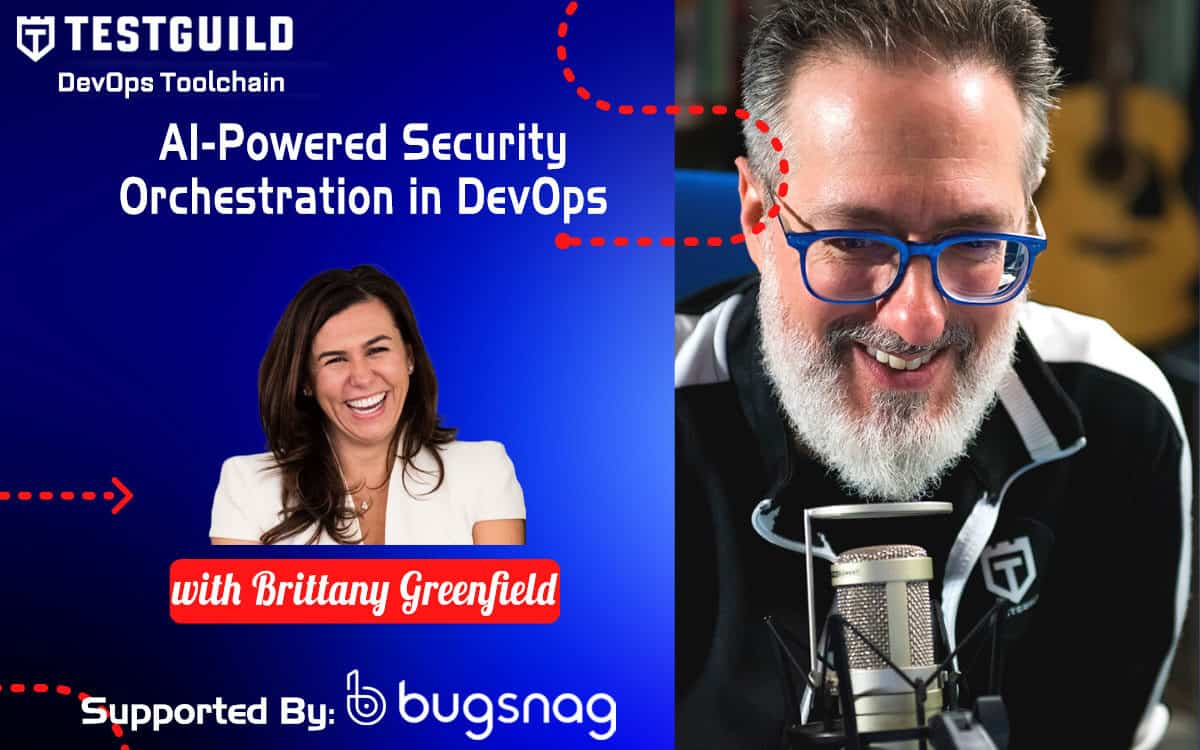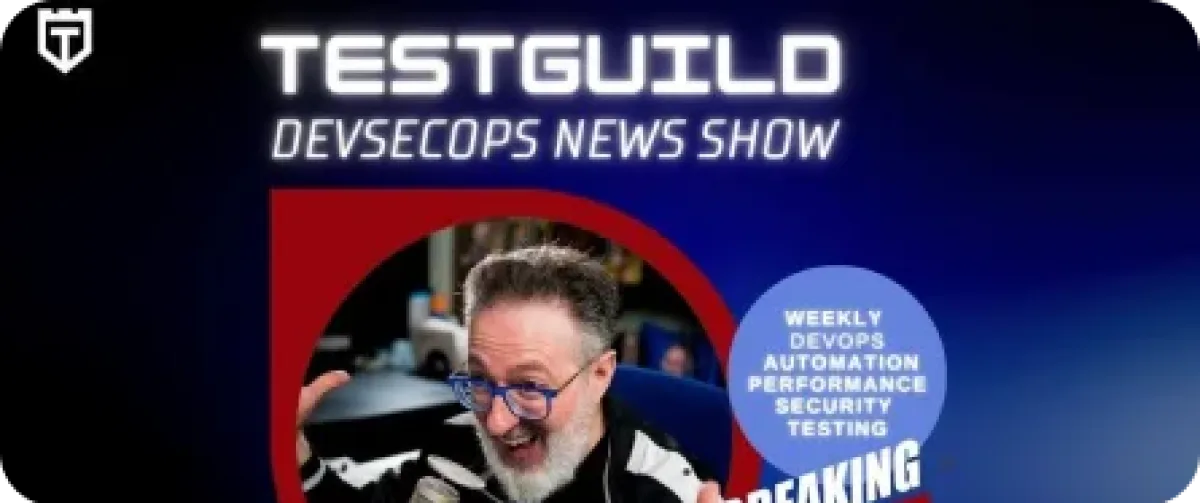About this Episode:
Get ready for the PAC Hero festival. In this episode, Henrik Rexed will share all the reasons why this is a must-attend event. Discover what’s new in performance engineering for experts worldwide like Scott Moore, Leandro Melendez, Mark Tomlinson, and more. Listen in to hear the latest hot trends, and why performance from a code perspective is also essential at this year’s PAC.
TestGuild Performance Exclusive Sponsor
SmartBear is dedicated to helping you release great software, faster, so they made two great tools. Automate your UI performance testing with LoadNinja and ensure your API performance with LoadUI Pro. Try them both today.
About Henrik Rexed

Henrik is a Performance Engineer at Neotys, a leading provider of load testing software. He has been orchestrating and conducting performance tests for over 15 years, delivering projects in all contexts including extremely large Cloud testing on the most demanding business areas such as trading applications, Video on Demand, sports websites, etc.
Prior to Neotys, Henrik worked as .NET architect for Logica and Performance testing expert on large accounts in a variety of industries including insurance, car industry, retail, and energy. Amongst the numerous initiatives he worked on, Henrik has built the performance Center of Excellence (CoE) handling load testing of all the European branches of a major insurance company.
Connect with Henrik Rexed
- Company: https://www.neotys.com/
- Blog: https://www.neotys.com/
- Twitter: https://twitter.com/Hrexed
- LinkedIn: https://www.linkedin.com/in/henrik-rexed-a85a8315/
-
PAC Heroe Festival
Full Transcript Henrik Rexed
Joe [00:02:10] Hey Henrik! Welcome back to the Guild.
Henrik [00:02:14] Yeah, it's great, it's a pleasure to be here with you, Joe. It's been a while. In fact, I think it was almost one or two years that I've been here on the show.
Joe [00:02:23] Yeah, you're right. I think it was 2019. So for the folks that missed that episode, is there anything in your bio that I missed that you want the Guild to know more about?
Henrik [00:02:31] Well, yeah I think basically, I'm more than 15 years on the load testing side and that the last 10 years since I've been working with Neotys have been heavily invested in myself in building plugins and protocols, any toolkits, or any solutions that will be meaningful for practitioners. We all want to validate before the how the application behaves under load and the performance side. So sometimes you need some small tooling to make your life easier. So this is what I'm trying to build for the community.
Joe [00:03:10] Absolutely. So Henrik I want to catch up a little bit, like you said, it's been a while since we last spoke. So let's speak about the vendors because I know you speak to a lot of different companies with a lot of different needs. So you have a certain pulse on the industry that take a lot of people don't see when they're just working in their own little piece of the world. So any trends or things you think performance engineers need to know a little bit more about that you see growing in the next couple of years?
Henrik [00:03:32] I think there are clearly, again, two worlds that are combining at the moment. They are the classical enterprise applications that we have a lot of our customers and partners are dealing with. Those will be more like package apps like you don't code, you customize or you change the configurations and then you measure how it goes. There are tons of them on the market. So there are obviously a lot of people focus on how can I bring value in a short time under obviously a lot of stress because those products usually cost quite significantly a lot for the organization. So there are large expectations about this. So this is more like, I would say, the one-shot big band load tests that are still happening sometimes. I think we can do a bit better way in that specific package apps environment. But then there is the, I would say, the modern world that is popping up. So all those companies that have invested in technology are compatible with the cloud. So Microservices where they try or they have started at least to implement early performance engineering in their day to day building process. They are trying to modernize the approach. And I think now that the next step is more on reliability. So you mentioned SRE, I think load testing is obviously a part of the SRE picture. But again, you don't test the same thing from a pure dev perspective and a pure SRE perspective. I think that the next step here is is more bringing value for SREs in the load testing, combining house engineering with load testing and so many people around us. I mean, there are so many companies, so many software vendors. They're coming up with AI. So is AI a buzzword? It could be. But of course, AI is a technology. And in many different areas in requite engineering space, AI is could help you a lot, especially these days where we have so many things to do. So having everything done manually could be very problematic for organizations. So we have to be smart. It may be machine learning and AI is the right stuff for us.
Joe [00:06:14] So you did mention SRE and how what can vendors actually do to help make the performance data we all have to deal with more accessible to other people on our team, like SREs?
Henrik [00:06:25] I think SREs are more close to the production side and upsides. Obviously the first thing similar to performance engineering. There is a real need of understanding, measure, observe, or closer to production. So they obviously want to measure the risks, automate things to secure production, and reduce any outage, potential outage, or failures. So I think that the first thing that you want to implement here is, is similar to performance engineering is you need to understand your system. So observing. So we're pulling solutions like white blocks, like white box monitoring, like EPM product, of course. It's the biggest, biggest milestone. And then, of course, you need to collect data from your app. So telemetry is obviously the right hot technology to do that. And once you have a pretty good understanding, then you have the rights to these metrics and alerts set in place. So then you can measure the risks and implement, of course, coast-to-coast engineering, but also load testing because engineering without load, it could be quite weird. And so but again, you need load testing and performance testing. It's like I said, all is always a simulation. So if you never do the right simulation that reflects real life. And of course, it won't bring any value for you. So understanding and knowing your system to be able to run the right tests is crucial. And I think with all the modern EPM vendors, all this technology like telemetry, it's become easier. And I think the big hot thing with the SRE is, of course, the notion of SLI, the notion of SLA, SLO, and SLI, where I think the biggest question that teams could have is which indicator should they pick? Which if I'm referring to (unintelligible) which type of attack or disaster I want to simulate during my tests. And those, of course, you will be able to know which indicator or which tech you have to imply in your tests by knowing and by observing your production. And this is now with all those modern APM solutions, I think we now have the keys to implement this mythology within our organization.
Joe [00:09:16] So you also mentioned AI. So as a vendor, how do you see AI playing a role with performance testing specifically?
Henrik [00:09:25] I mean, it's been three years internally at Neotys that we've been working on prototypes. Implementing, I would say more than machine learning side, because I think the biggest pain that we are facing here in the load testing because Neotys is a load testing vendor so we are trying to figure out where we can implement AI and machine learning in a smart way. And so we looked at the various areas that could be worth…so without naming them. Of course, we have to design. So how could we make a design faster? And I need to analyze. So how can I detect things automatically? And of course, last is I need to make sure that my tests are relevant. And so we decided to pick the topic that would be more helpful for our customers and prospects and partners, which is how can I scope and identify precisely what should I test based on observations. So we've been working. So now we have a, I would say, a first release of this solution that we are implementing at a few customers. So it's a solution that attracted the traffic that you have in your production environment and machine learning would be there to basically detect the common use of flows, common user actions, showing you what type of test case you should test in your load testing. What are the think time, the pacing, what is the load policy issue apply? And so on and so forth. This is what we've been working on. I think, for now, we have a pretty good solution. We are eager to show it more globally to the market, but we are just waiting to get to enough maturity with the help of feedback from partners and customers to sort of share it to the market like this. I think that will be the first milestone like I said. The biggest thing that I see around us is that it happens a lot, quite frequently that tests are not reflecting real life and this is causing a lot of bad reputation for the industry. So I think if we are able to save that with the help of machine learning and AI think, yeah, we will succeed and then we can maybe think of where we could apply machine learning in other areas of the program, maybe analyze this or design in the future. So let's first deliver and save that pain of building the right scenarios and then we figure out what will be the next milestones.
Joe [00:12:14] Absolutely, and I think one of the issues with performance testing as well as you have a lot of people that don't necessarily understand it, but they get a tool and they overdo it. So I think there's a big need for education. So along those lines, I think you've been doing an online event for, I think over five years now. I might be wrong. Maybe it's longer. It's called PAC so for the folks who are unaware, what is the PAC or the Performance Advisory Council about?
Henrik [00:12:36] The PAC has been created initially to help the community like you mentioned. The problem with performance in the load testing industry is that there's no clear indication and so people have to learn by frustration, failures, and projects. And I think there are so many people doing awesome things around us. So why don't we ask those experts to come present, share the ideas to help the community to learn and understand what are the new techniques, what are the new frameworks that maybe they could look at it? Um, so I think that that was the main purpose of the PAC. So it's a free conference where we try to get the best experts in the industry. And then they are here to present a topic and share it with the community. So we've built two distinct formats of the PAC, the physical PAC and the virtual. Now, the physical PAC this year, because of the current Covid crisis, we thought that we'll reschedule it later. Maybe we will have a chance to organize a real physical event again. So that's why we created the virtual event in March this year, again with the PAC Hero. So the difference between the two events is that the physical one it's not an open event. We sort of come in a nice environment. We bring 15 to 16 experts and we talk. It's similar to the things that have been built a few years back with a whopper. So we try to get some topics. We discuss, we share, and then we exchange with the various experts. The other format is the virtual one and the virtual is more accessible for everyone. So it's a twenty-four-hour live stream conference. So the concept is very simple. We start with New Zealand and then we follow the sun until we reach California. So it's a twenty-four-hour marathon for me at least as a moderator. And during twenty-four hours you will have the chance to listen to one of the 20 speakers that will be part of the conference.
Joe [00:15:07] So I think every year has a theme. And this year, what's this year's theme?
Henrik [00:15:12] So this year's theme is rock and roll. So we're going to pretend that we are the organizer of a rock festival. So every speaker would be a rock star. And so there will be various stages during our festival, 24-hour festival. So everyone will be able to come and listen to their great performance songs that they have to share with our community.
Joe [00:15:46] You have six performance rock stars, but it looks like there are eight sessions. How many sessions are there going to be? I assume more since you're going twenty-four hours.
Henrik [00:15:53] Now there is obviously more. We wanted to start promoting six by six. So we started last Friday by sharing the name of six of the speakers. And this year we wanted to do it a bit differently because I think we covered quite well the various topics related to performance, load testing, how to automate all the pipeline approaches, and so on over the last three years. And I think this year I wanted to have, of course, themes related to performance and load testing as usual, but also bring experts that could give recommendations more on the code level. So both world performance and the code, performance on the app. So we will cover both things. We will have, I'm pretty excited this year because we have pretty good speakers in this event. So we have a couple of speakers from Facebook. So Goranka will talk about capacity planning for probably product Facebook. We will have Dennis Barkov, who would explain how to become good at optimizing your code. We have a couple of and a great engineer from Facebook who basically did a recent performance summit, Taras Tsugrii so he will be also part of us, part of the experts. So there will be a mix of between a traditional load and performance testing and pure things related to the code. I think that would be very interesting. So both worlds will be covered during this specific PAC Hero.
Joe [00:17:44] So why the emphasis this year on having a more code-level type track? So when you mean code level what does that mean? Is it writing performance testing code or actually implementing more performance code?
Henrik [00:17:56] More on the app level and not on building your test cases, but more on a couple of concepts about when you build your app or things that you should consider. Basically the best practice around that. So I think this has never been very covered over the last PAC. We've been very focused on performance and load. And I think it makes sense to open doors as well to more speakers that could also address the DevOps community as well. So because now I mean, it's what everyone is facing as of now. Performance engineers are definitely in a direct relationship relation with the developers. It makes sense to cover topics for traditional performance engineer but also developers that also do performance activity.
Joe [00:18:49] So it's a shift that's been going on, shift left. So as more developers get involved in making their code more perform, it makes sense because rather than wait till the last minute as we test it from a testing, you can’t test anything that's not testable. So I guess you can't put in a performance that's not performance. So it sounds like more how developers can create more code that behaves better performance-wise. That's what it sounds like.
Henrik [00:19:13] Yes, I'm very, very excited to do that. So that will be the big news, I would say, on the format of the PAC. And also one big thing about the PAC, from my perspective, it will be my last PAC as a moderator. So for me, it's like the big epic. I want to make it epic and fun again because I won't be the next moderator for the next PAC so I'm eager to have an awesome last PAC from a moderator perspective.
Joe [00:19:52] Interesting. So do have a new moderator lined up? Is it because this is something that you're going to phase out or what's going on there?
Henrik [00:20:01] And I will announce it on the day of the PAC. Let's keep it a secret.
Joe [00:20:08] So you definitely have to stay tuned. Join the event. And as you mentioned, it is a free event. All people need to do is go to neotys.com/ Do you have an easy-to-remember link that people can go to register?
Henrik [00:20:21] It's a very complicated link and URL, but we have a LinkedIn page. So if you search for Performance Advisory Council, you will find a specific LinkedIn page there. Otherwise, the website is www.neotys.com. N-E-O-T-Y-S dot com /performance-advisory-council.
Joe [00:20:47] So you did mention this is going to be kind of cool because you're also introducing code-level type topics. Are there any other more like red meat for performance engineers as well? Sessions that you are interested in that you think people are going to really be blown away by? maybe Scott Moore I think is joining, Stephen Townsend, Andreas Grabner, people that I think performance engineers know already.
Henrik [00:21:10] So it will be, of course, yes, Scott Moore will be there. Mark Tomlinson from PerfBytes will also be there. We also have our friends from Akamas that will cover the optimization aspect. There is also Lloyd Watts. So he's been quite active on social media. And I think his platform is interesting. So I want to make sure that everyone understands the value of his platform. So measuring the last mile through real devices. So that's why I think it makes sense that he comes and explains, comparing traditional cloud generators and the value of his own platform. So I think that will be beneficial for everyone. And we also have Harinder Seera who is based in Melbourne. He will share his experience with the DynamoDB. So I think that will be also interesting and of course, we have Stijn Schepers that will be there focused more on the database site so that will be interesting to have his own vision on this aspect as well.
Joe [00:22:20] So I think it's a point, even though you are a vendor, this event is very nonvendor centric from my experience. Is that correct?
Henrik [00:22:27] Yeah, we don't care about tools. I think you mentioned, when people do performance, they try to assimilate performance to a tool or tools. I mean, Neotys does a great job with NeoLoad but the main objective of the conference is not to promote our product or any other product. It's more about sharing mythology, tips, or even if there is any new framework that could be beneficial for everyone. So even if it's sponsored and powered by a vendor like Neotys, we are not here to promote any tools. So if you want to talk about things that you've achieved with, I don't know, JMeter or K6, or anything that you that are in the market, feel free to come and talk at this conference.
Joe [00:23:24] So I know this was about the festival itself. I also just want to touch base with Neotys because there are people that listen and do use Neotys. I know you're always working on new releases. I think you have seven, eight releases. Is there anything that you want to announce with the new release of NeoLoad or anything that you think folks may want to know about?
Henrik [00:23:42] So we're doing a release every eight weeks. We've been in the last few years, we've been investing in and putting a lot of effort to build our web technology. So NEO Web, it's been there now for three years, but we are adding more and more features to this. So the solution talk about that scans your production and drives your tests will be coming soon on this. We are adding more and more design aspects on the web, more analysis. We have a lot of API now. So for people who are looking for collecting the raw data in the system, we have API for this. And we also have worked on integration with the Gremlin, so chaos engineering. So if you have to do any load test and simulate or any failures or disruptions on your environment are now with this technology, you can drive your attacks directly in NeoLoad and you'll be notified in your tests. So it will be very helpful when you have to combine both activities. Usually, chaos engineering is on one side, you have load testing on the other side, but there is nothing communicating between each other. So we've been working on this. We have also been working on a lot of integration with test management platforms because I think it makes a lot of sense for any projects to have automatic reporting. So if I run a load test, I want to make sure that the project leaders are the team leaders are aware of what was the results or where they can find the status of my test. So this is what we've been working on quite significantly. And the major leads that we have is this summer that we have a lot of great things that are coming, more analysis side. So stay tuned and you will learn here a lot of great things about new features (unintelligible).
Joe [00:25:53] Okay Henrik, before we go, is there one piece of actionable advice you can give to someone to help them with their overall performance engineering, performance testing efforts? And what's the best way, once again, to find, contact, or learn more about PAC, the PAC Hero festival?
Henrik [00:26:07] So I would say if you do load testing or you have to test your performance, the application of your application, I would say, first of all, try to understand your app. Don't start testing if you don't know your app. You cannot test the black box. Now you have to understand what's in your box, how are the boxes behaving? And then you will be able to deliver the right tests and the right way of analyzing and collecting data to measure the level of performance. That will be my major advice. On the PAC, if you want to reach out to us, I think the best will be LinkedIn if you have a LinkedIn account. We are trying to be active on this. Or you can send an email directly to me. So Henrik, H-E-N-R-I-K, henrik.rexed@neotys.com.
Rate and Review TestGuild Performance Podcast
Thanks again for listening to the show. If it has helped you in any way, shape or form, please share it using the social media buttons you see on the page. Additionally, reviews for the podcast on iTunes are extremely helpful and greatly appreciated! They do matter in the rankings of the show and I read each and every one of them.




